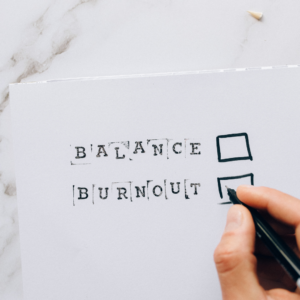What is meant by “Burnout?”
Most of us, at some time or another, have experienced spells of exhaustion, hopelessness and feeling undervalued in our careers or work life. If you think these feelings have escalated since the onset of COVID-19, then you are not alone. A new study found that nearly 90% of respondents in more than 40 countries felt that their work lives got increasingly worse during the pandemic. And more than 60% felt that they were experiencing the phenomenon now commonly known as “burnout” often or very often.

So, what is burnout? WebMD defines “burnout” a form of exhaustion caused by constantly feeling swamped. It’s a result of excessive and prolonged emotional, physical, and mental stress. Burnout happens when someone is feeling overwhelmed, emotionally drained, and unable to keep up with life’s incessant demands.
While burnout is not yet an officially medically diagnosed condition, it is believed to be the root cause of many physical, emotional and mental health issues. Prior to the pandemic, The World Health Organization (WHO) officially recognized burnout as a “syndrome” that was specifically tied to “chronic workplace stress that has not been successfully managed.”
Signs and Symptoms of Burnout
Mental health experts say it is critical for individuals to address burnout because it can have long-term consequences on their mental health – specifically, as a risk factor for depression, substance abuse, and suicidal thoughts or feelings.
What makes it different from clinical depression or anxiety is that the triggers for burnout are directly tied to a person’s relationship with their job. For many, setting boundaries for work-life balance became increasingly hard during the pandemic, as people shifted to teleworking from the comfort of their homes. The lines between work-life/home-life became blurred, increasing the risk for burnout. Experts say our brains are not wired to be chronically in fight-or-flight mode, so it’s important that we recognize when our thoughts and feelings are racing, and take a break.
Some physical signs you might be experiencing burnout include: feeling tired all of the time, frequent sickness from lowered immune system, frequent headaches, joint or muscle pain, changes in sleep patterns and/or appetite.
Emotional and behavioral signs of burnout could look like: feelings of helplessness, feeling unmotivated, withdrawing from activities or responsibilities, using food or alcohol as a coping mechanism, procrastination, short-temperedness, starting work late or logging off early.
Managing Burnout

Experts advise that for people still working out of the home, keeping a daily routine of basic normalities like getting dressed, stepping away from one’s desk for lunch, and “logging off” at a reasonable hour (as you would if you were commuting daily). These are all small changes in your day that can have a positive impact on your overall mental well-being.
Employers can also help by addressing burnout head-on and encouraging an open dialogue about it in the workplace. Experts say that by talking openly about mental health stresses in an organization, employers, managers and employees can cultivate a healthier environment with a culture that normalizes these feelings, rather than creating shame or stigma around them.
Another way to combat burnout is to be more intentional with your time. Find causes or activities that are meaningful to you and carve out time to focus only on those. Whether it’s a sport/social club, or volunteering, simply interacting with people outside of work about things that interest you is a great way to disengage your brain from work and the stressors that lead to burnout.
In addition, try taking a break from technology. Many people spend their “downtime” looking at their phone or the internet, which inevitably leads to them seeing a work email (or other work-related notification), or reading an article that reminds them about work. In that time, they weren’t actually disassociating from their job. Try to set aside time to be away from your phone, off your computer and away from social media entirely.
If you are feeling the symptoms of burnout and need help, please contact us today. Our clinicians can help you manage expectations, create a plan for yourself that promotes resilience, and provide you with the tools you need to manage your personal self-care practices to avoid long-term burnout-related health issues.
